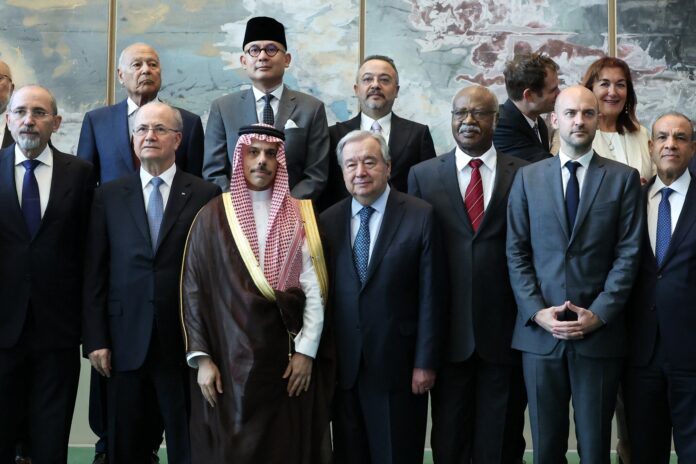Rising Diplomatic Pressure After Controversial Remarks
Arab governments and international organizations have intensified their calls for United Nations intervention following Israeli Prime Minister Benjamin Netanyahu’s recent statements suggesting the displacement of Palestinians from Gaza. The remarks, made earlier this month, have drawn sharp condemnation across the Arab world and beyond, as leaders warn of the threat to regional stability and international law.
On September 6, 2025, Saudi Arabia’s Foreign Ministry issued one of the strongest rebukes yet, denouncing Netanyahu’s comments as a “flagrant violation of international law and a direct threat to international peace and security.” Riyadh specifically urged the permanent members of the UN Security Council to act decisively to halt “Israeli aggression against the Palestinian people and their land.”
Arab Parliament Calls Displacement a War Crime

The Arab Parliament, through Speaker Mohammed Al-Yamahi, echoed these concerns and described Netanyahu’s rhetoric as part of “decades of ethnic cleansing and forced displacement policies.” Al-Yamahi emphasized that forced displacement constitutes a war crime under international law and is not subject to any statute of limitations. The Parliament issued a firm rejection of any attempt to displace Palestinians from Gaza, the West Bank, or other occupied territories.
Egypt and Qatar joined in the wave of criticism. Egypt’s Foreign Ministry called the Israeli leader’s statements an effort to prolong regional conflict while avoiding accountability for violations in Gaza. Foreign Minister Badr Abdelatty reiterated Cairo’s position that the Rafah crossing, which connects Gaza to Egypt, serves purely humanitarian purposes and cannot be used for displacement. “Displacement is a red line for Egypt,” he declared.
International Civil Society Pushes for UN General Assembly Action

Beyond regional governments, international coalitions are mobilizing for UN action. On September 5, the Lifeline for Palestine coalition—led by former US presidential candidate Jill Stein and backed by former UN human rights official Craig Mokhiber—launched a global campaign urging the UN to activate the “Uniting for Peace” mechanism. This Cold War-era resolution empowers the General Assembly to circumvent Security Council deadlock, particularly in cases where veto powers prevent action.
Mokhiber, who spent three decades at the UN, explained that member states “have the power” under the resolution to take decisive steps, including sanctions on Israel, suspension of its UN membership, an arms embargo, and even the deployment of a UN peacekeeping force to Gaza and the West Bank. “The world doesn’t have to surrender to a US veto in the Security Council,” Mokhiber stressed.
Calls for Multinational Protection Force Gain Momentum
These initiatives come ahead of a September 18 deadline set last year by the UN General Assembly for Israel to comply with International Court of Justice rulings related to Gaza. Palestinian groups and international civil society organizations have called for mass global mobilization on that date, demanding the establishment of a multinational protection force in Palestinian territories.
The proposal draws on historical precedents. In 1956, for example, the UN General Assembly authorized the deployment of the UN Emergency Force to the Sinai, with Canada playing a central role in its formation. Advocates argue a similar force could now be sent to Gaza to safeguard civilians, ensure the flow of humanitarian aid, and preserve evidence of alleged war crimes for future accountability.
Mounting Concern Over Israeli Escalation Plans
Tensions have intensified following Israel’s announcement of plans to occupy Gaza City, a move that analysts say could displace hundreds of thousands of Palestinians. The UN Security Council convened an emergency session on August 10 to discuss the escalation, during which senior UN officials warned that Gaza could soon face “another horrific chapter” in its ongoing humanitarian crisis.
Observers note that the international community is increasingly united on the issue. Currently, 147 countries officially recognize Palestine as a state, and recent UN votes show strong global support for Palestinian self-determination. Many diplomats believe this backing provides the necessary two-thirds majority in the General Assembly to authorize protective measures under the “Uniting for Peace” framework.
Geneva Session May Prove Decisive
The upcoming UN General Assembly session could mark a turning point. The meeting, relocated to Geneva after the United States denied visas to Palestinian leaders, is expected to serve as a critical venue for advancing proposals to protect Palestinians and counter Israel’s actions. With growing international pressure, advocates believe the General Assembly may finally overcome years of paralysis at the Security Council.
A Defining Test for the UN
The debate over Netanyahu’s displacement plan has quickly become a test of the UN’s ability to act when powerful member states block action at the Security Council. Arab nations, regional organizations, and international coalitions are presenting the issue as one of global credibility: whether the world body can uphold international law and protect vulnerable populations in the face of great-power politics.
As deadlines loom and diplomatic momentum builds, pressure on the UN to intervene is mounting. Whether the General Assembly will seize the moment and authorize concrete measures remains uncertain, but Arab nations and their allies have made clear that the stakes—for Palestinians, the region, and international order itself—could not be higher.
Sources: Al Jazeera

